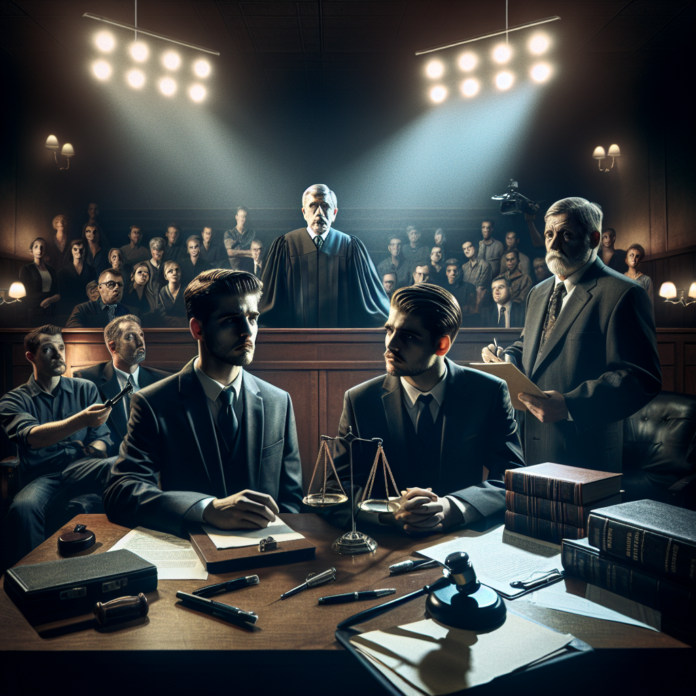In a dramatic twist of fate, the Menendez brothers, Erik and Lyle, could be on the brink of freedom after serving decades behind bars for the high-profile murder of their parents. The Los Angeles District Attorney has made an unprecedented recommendation: the judge should consider resentencing the brothers under a law that acknowledges their age at the time of the crime. This surprising development, which comes at a politically charged moment just weeks before the DA’s re-election, has divided public opinion and ignited debate among legal experts and celebrity supporters alike. As Judge William Ryan deliberates, proponents of the brothers’ release highlight new evidence of past abuse, questioning whether justice has truly been served. Meanwhile, critics denounce the DA’s move as mere political maneuvering. All eyes are now on the courtroom, where the judge’s decision could herald a new chapter—or a continuation of an old saga—for Erik and Lyle Menendez.
Resentencing Recommendation and Its Implications
The potential release of the Menendez brothers, Erik and Lyle, has captured national attention yet again, decades after their conviction for the murder of their parents. The brothers, who were sentenced to life in prison without the possibility of parole, have been the subject of intense debate since their original trial. Their case has garnered renewed interest following the release of a Netflix series about their story, and their plea for freedom is now bolstered by the Los Angeles District Attorney’s recommendation for resentencing.
The DA’s decision to advocate for resentencing hinges on legislation that considers the age of the perpetrators at the time of their crime. Since Erik and Lyle were under 26 years of age when they committed the murders, they could be eligible for parole immediately if the judge accepts this recommendation. This law reflects a growing understanding that young people have a unique capacity for change and rehabilitation, and it acknowledges that those who commit crimes at a younger age might deserve a second chance at freedom.
Controversy and Criticism
However, the recommendation is not without controversy. Some critics argue that the DA’s move is a strategic ploy to gain public favor as he approaches a difficult re-election battle. They suggest that this high-profile case has been opportunistically used to boost his political image. In a fraught election cycle, where every decision is scrutinized, the DA’s motives have been questioned, casting a shadow over what could potentially be a genuine belief in the brothers’ rehabilitation.
New Evidence and Celebrity Support
The possibility of parole for the Menendez brothers also brings a spotlight on new and previously unheard evidence. Two key pieces of evidence have surfaced, which some believe should significantly influence the case: a letter allegedly written by Erik to his cousin claiming abuse by their father, and allegations that their father molested a member of the boy band Menudo. These claims of severe abuse have been central to the defense’s argument from the beginning, positing that the brothers acted in self-defense against their tyrannical and abusive parents.
Supporters of the Menendez brothers, including high-profile figures such as Kim Kardashian and Rosie O’Donnell, have weighed in, advocating for their release. Kardashian, known for her work in criminal justice reform, has reportedly visited the brothers in prison. O’Donnell, who considers herself a “big sister” to them, has publicly sympathized with their plight, arguing that their actions were driven by the abusive environment they endured. These celebrity endorsements add another layer of complexity, drawing public sympathy and highlighting broader discussions on the justice system and its treatment of young offenders.
The Judge’s Decision
Yet, despite the DA’s recommendation, the decision ultimately rests with Judge William Ryan. He has several options: he can accept the recommendation and grant the brothers parole, reject it, or approach it differently, potentially leaving their fate in the hands of the parole board. If the judge decides against resentencing, the brothers could remain incarcerated for the entirety of their sentences, akin to others convicted of first-degree murder.
Critics of the brothers’ potential release argue that they are convicted murderers and that their actions should not be excused, despite any claims of past abuse. To them, resentencing could set a concerning precedent, potentially minimizing the severity of their crime. The debate reflects a broader societal conflict over how to balance justice for victims with the potential for rehabilitation in offenders, particularly those who were young at the time of their crimes.
Legal Implications and Societal Reflection
The legal implications of the judge’s decision are significant. Should Erik and Lyle walk free, they would not face prosecution for the murders again due to Double Jeopardy laws, and with the statute of limitations having expired, civil lawsuits are off the table. For the brothers, freedom would mean the end of a decades-long legal saga; for their critics, it might feel like an injustice.
As the world watches Judge Ryan’s decision, the Menendez brothers’ case remains a potent symbol of the complexities inherent in the criminal justice system. It forces us to grapple with uncomfortable questions about culpability, punishment, and the potential for redemption. Whether or not the brothers are ultimately freed, this case will continue to prompt discussions about how the system balances past abuses with present actions, and the role of age in determining accountability.
The judge’s impending decision could mark a new chapter for Erik and Lyle Menendez. With potential implications for future cases involving young offenders, this decision is more than just about these two individuals—it’s a reflection of evolving attitudes towards crime, punishment, and the power of the justice system to offer second chances. As society continues to engage with these complex issues, the Menendez case serves as a reminder of the ongoing struggle to achieve true justice in a flawed system.




